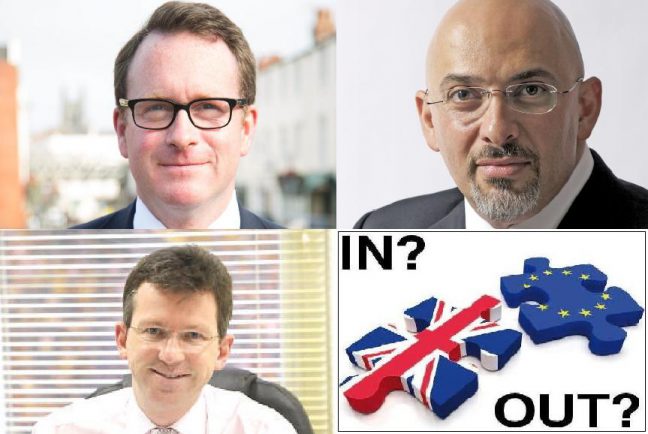VOTERS in Britain are set to go to the polls on June 23 when they will take part in an in-out referendum to decide whether the country should leave or stay in the EU.
Below are the thoughts of our three local MPs, Jeremy Wright, Chris White and Nadhim Zahawi.
Jeremy Wright (Kenilworth and Southam MP)
VOTING IN
On June 23, the people of the UK will be making the most significant political decision most of us will ever make – whether we should remain within the European Union or leave it.
It is a decision which will affect our nation’s place in the world, its prosperity and its future for many years to come and none of us should take it lightly.
I have reached my conclusion after a great deal of thought and, frankly, it could have gone either way.
I feel immense frustration at the seemingly endless, often pointless regulations that flow from Brussels, I resent the expansionist tendencies of the European Court and I disagree profoundly with the pursuit of a United States of Europe.
Much in the European Union today is bad and if we were being offered a choice between the status quo and leaving, I would choose to leave.
I have never believed our membership of the European Union should be based on shared destiny, but rather on hard-headed national interest.
At the point at which EU membership is no longer benefitting Britain, I would say we should go. So my decision depends on the answer to 2 questions:
1) Is the deal the Prime Minister did in Brussels on 19th February better than the status quo? And,
2) If so, is continued membership of the EU on those revised terms, on balance, in the UK’s best interests?
On the first question, the deal is not perfect. It does not do all I would wish for, but every negotiation requires compromise and compromise, by definition, means less than you would wish for.
The real test is, does it put the UK in a better position? I believe it does. It strengthens the hand of countries, like us, who do not want to be part of the Euro currency, to demand equality with those countries who do.
Crucially in my view, in terms of the EU’s direction of travel, it not only extracts the UK from participation in ‘ever closer Union’ but also redefines that concept so that it can no longer be used as an easy justification for the onward march of federalism.
Given the importance of this agreement in interpreting the EU Treaties, this is a significant help to the UK in resisting European decisions and court judgments we don’t want.
The deal gives us more scope to restrict benefits for EU workers who have not paid into the benefits pot, in addition to benefit reductions we are already making for EU citizens in the UK who are not working.
That is right, it is fair, and I believe it will have an effect on the number of EU migrants who seek to come here.
Of course it is true that leaving the EU would give us much greater control of these things and it is true too that leaving the EU would mean we don’t have to comply with any EU laws we don’t want to, but that takes me to the second question I asked earlier.
EU membership has costs, but it also has benefits, so which is greater?
As I said, I think the deal the Prime Minister has done tilts the balance in the right direction, but it doesn’t answer the question.
We also have to consider the intra-EU cooperation on security and crime. We have to consider whether the UK alone with tens of millions of consumers could negotiate trade deals as favourable as the EU, with hundreds of millions of consumers, with countries and trading blocs around the world.
We have to consider too not just the net cost of direct payment into and benefit received from the EU budget, but also the overseas investment that comes into the UK at least partly because of its membership of the European Union.
For example, a large proportion of the employment in my constituency is provided by Jaguar Land Rover (JLR) and its supply chain. JLR is a global company, no longer British owned – it can invest where it likes.
I would like to think that JLR would continue to build factories and employ designers in a UK outside the EU – we would continue I am sure to offer favourable tax rates and high skills, but I am reluctant to give up another advantage – access to a large market without tariffs, that the UK in the EU can offer JLR as it makes often marginal calls on future investment. The decision on June 23 is not just about theoretical political principles, it is about real family incomes.
Those who say our relationships beyond Europe matter are surely right.
But the United Kingdom has held its permanent seat on the United Nations Security Council, has retained its strong connections with the Commonwealth and its partnership with the Unites States, as well as our participation in NATO, all while a member of the European Union, and few in any of those other relationships are advising us to leave the EU.
For all these reasons, I have concluded that, on balance, the right decision is to remain in the EU which, by the way, we should continue to work to reform.
Others will come to different conclusions but the great thing about this referendum, which has been so long in coming, is that everybody’s vote counts the same – this is not a decision just for politicians, but for all of us.
Chris White (Warwick and Leamington MP)
VOTING IN
This will be a historic decision and not one that will be made in the House of Commons but by all of us eligible to vote.
As your representative in Parliament, I feel it is appropriate to share with you my thoughts on Britain’s membership of the European Union.
This debate inspires a great deal of passion and I respect the views on both sides of the argument. The world has changed significantly since the last referendum on Europe was held in 1975, not least in terms of trade and security.
I will be voting for the UK to remain a member of the EU. I cannot in all conscience support the alternative; to leave and the uncertainty that would bring.
Let me give one example of where we are: the number of unemployed claimants in Warwick and Leamington has fallen by 80% since 2010. To leave at this time risks a reversal of progress made both locally and nationally.
I know what the world looks like now, I know what the negotiation has achieved, but I do not know what the UK will look like outside the EU. For that reason, at a time of global economic uncertainty, I will be voting to remain.
Nadhim Zahawi (Stratford MP)
VOTING OUT
I believe David Cameron is a brilliant Prime Minister who has been assured of his place in history by creating and leading a reforming Government tackling head on issues that hold our country back.
He’s overseen a growing economy which had to be returned from the dead, a revolution in our schools, a needed change in our attitudes towards our welfare system and a vast increase in the rights of gay people.
It is my instinct to back my leader – one who has delivered a Conservative election victory for the first time in over 20 years while taking on the hardest job in the country with a commanding ease.
Before being elected to Parliament, I was part of the business world. I’ve bought companies both inside and outside of the EU. I have experienced the role that Europe can play in making this easier, and how it can free up trade and help business. I’ve therefore always been supportive and defensive of the potential of the EU to help the British economy, and it’s why I wrote in October about my hopes for a multi-speed Europe.
I have been extremely supportive of the Prime Minister’s efforts to reform Europe in a way that no British leader has attempted for decades. He has taken on this task with impressive commitment and tireless vigour.
He agreed a deal with the other 27 leaders of member states after a final burst of almost two days of hard negotiations, and a marathon effort of personal meetings stretching back many months.
However, I do not believe that I can recommend this final agreement to my constituents.
Britain is a great country. I truly believe this and know it better than most, having been welcomed into this nation of opportunity when seeking safety from Saddam Hussein as a nine-year-old child.
I do not have a desire to turn back the clock, and revert Britain back to an imagined past that was supposedly more glorious than now.
I do not think modern Britain is a disaster, nor feel the need to repeat Donald Trump’s cry that we have to make our country great again.
What I want is the greater Britain that the Prime Minister spoke about at the party conference last year: “a Greater Britain, where people have greater hope, greater chances, greater security”. The question has to be how best to get us there.
The British people and the British Government want to trade with the world, while trading with our European neighbours as we always have. This is our path to greater prosperity, more jobs, higher wages, lower taxes.
This is our path to the country this Government wants.
I had hoped we could achieve our goals within the European Union, but it increasingly seems that this may not be possible. The sheer amount of time and effort that the Prime Minister has had to invest in this process is indicative of an EU that does not want to change in the way we wish.
If we vote to leave, our exit will be subject to a new negotiation and this will cover the issue of trade. Europe sells more to us than we sell to them. It would be an act of self-sabotage to refuse to trade in a normal way with Britain, the fifth, soon to be the fourth, largest economy in the world – it is hard to take any threats on this front too seriously.
The big change will be Britain’s trade with the rest of the world.
The EU has an ever-falling share of global GDP, and we are too constrained with our current relationship, where Ministers are unable to make every decision they may wish to.
Our future is increasingly based in the digital and technology sectors. A Britain outside of the EU can be ambitious in taking these new opportunities for growth, and export to the world, but our Government and our country must be agile to take advantage of fast paced changes – an agility that we lose in the EU.
I listen carefully to the Prime Minister about security; I share his view wholeheartedly that we live in an increasingly dangerous world.
I believe the European Arrest Warrant is absolutely vital, and was delighted that Theresa May led our party into opting back into it in 2014. I would be very disappointed if we lost this power to quickly extradite dangerous criminals back to the UK.
However, although the Prime Minister was right to extract concessions about the amount of benefits migrants from Europe can claim we still cannot directly control who comes here from Europe.
This provides its own threat to security. Interpol has already stated its concerns about the number of jihadists that have travelled into Europe, amidst fears there could be up to 5000.
Although being part of the EAW has huge benefits, I am concerned that not having full control of our borders contains big risks too.
The Prime Minister has again worked hard extracting promises about how Britain will be treated as a non-Euro member state, and I welcome that the EU wish to place this new status in revised treaties – however, this may not happen before the end of this decade.
Although all 28 member states have made these promises in good faith now, there is much that can change during these years – new governments, a financial crisis, another collapse of the Euro, confrontation with Russia or ISIS.
I am unconvinced that promises can be sustained over a period of time in a world that rapidly changes and creates new threats and fears.
The reluctance of European leaders to change, and the effort that has been expended to get us to this point only makes me more concerned.
I am uncomfortable with a situation in which our laws are sometimes made by those the British people cannot throw out, while British Ministers must accept them.
I am uncomfortable when European law takes precedence over British law, and European judges are more important than our own.
I am uncomfortable when we are tied to a project determined to create a new currency that has struggled to stay afloat and has taken away yet more sovereignty and choice from its citizens to keep it on life support.
There are some extremely unattractive figures campaigning to leave the EU, from George Galloway to Nigel Farage and it pains me to be dragged towards them on any issue.
However the blame lies with the EU – which has fought as hard to remain blind to the chance for change, as the Prime Minister has fought to help them see.
The mark of a Conservative is a distaste for sudden unnecessary change that can lead to unintended consequences. I am automatically suspicious of making this sort of decision, but I have come started to believe that in this case it is necessary.
I would not begrudge the country for voting to remain; there are real unknowns and uncertainties and no one can deny that. However, I believe that a vote to leave could be a fantastic opportunity to achieve this greater Britain we all want to see.
If we leave, we can set about our task of creating an increasingly agile pro-business country, leading the world in innovation and technology while remaining a political and moral power.
A country that can change itself and change the world. A country that recognises the greatness we already have, but pushes on to something that is ever greater still.
I’m saddened, but on balance the chances of creating the greater Britain I want to see are increased by leaving the EU.











